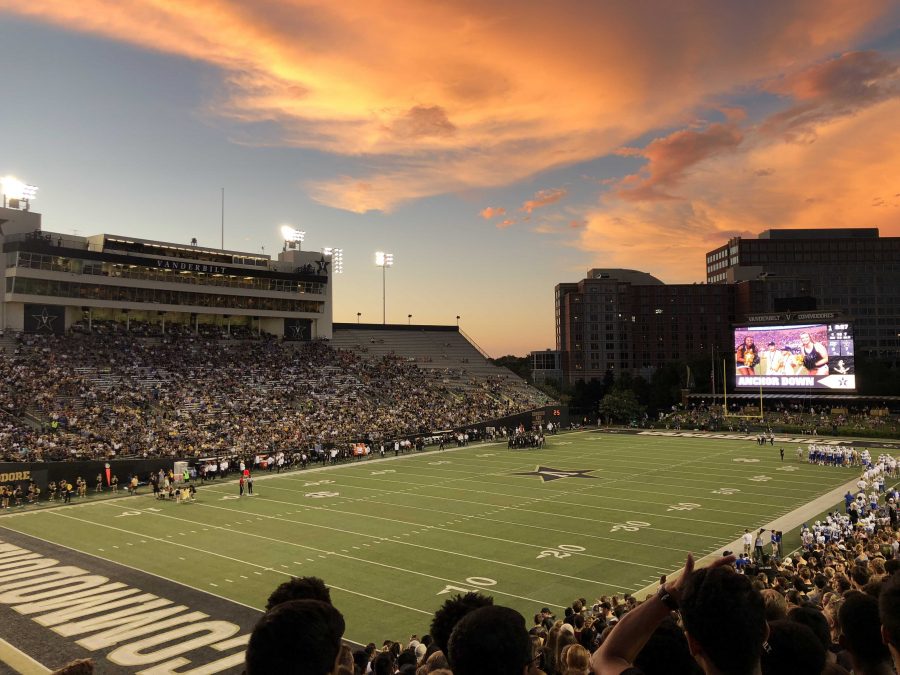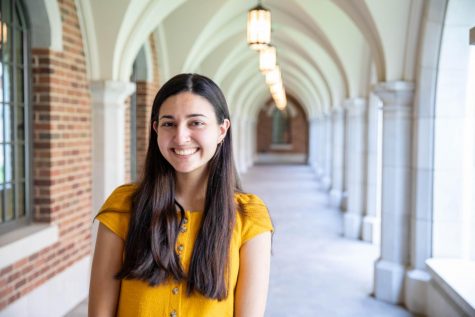Last month, Vanderbilt secured the third spot on the 2019 Princeton Review list of the happiest college students, an achievement causing celebration as well as apprehension among students and faculty.
The ranking marks a two-spot drop from last year and the year before, when Vanderbilt secured the top ranking. Princeton Review scores schools based on how strongly surveyed students agree with the statement, “I am happy at my school.” College of William and Mary and the University of Oklahoma surpassed Vanderbilt with first and second place, respectively.
The responses to the survey rely on both the school to distribute the survey as well as their independent efforts to get student responses, according to the Princeton Review website. The Office of the Dean of Students has chosen to not distribute the survey to the student body, Dean of Students Mark Bandas said.
“As a consequence, it is difficult to assess the significance of the ranking,” he said.
Furthermore, Bandas noted the lack of clarity in the survey’s intention behind their assessment of “happiness.” The term can refer to a wide variety of definitions, from ‘customer satisfaction’ to well-being, he said.
“While it is always gratifying to be lauded by a national survey, what the survey’s inquiry about happiness measures is not quite clear,” he said.
Despite the lack of clarity in the wording of the statistic, the survey has provided significant responses from the Vanderbilt community. The causes and impacts of the ranking are varied; mental health, inclusion, facilities, academics and more have a role in the way students inform the rankings as well as react to them.
Mental Health and Inclusion
Mental health contributes to students’ happiness and the survey’s ranking; simultaneously, the results of the survey may in turn affect students’ mentality.
Students may have responded positively to the survey because Vanderbilt has made strides towards providing students resources that promote acceptance beyond surface levels of happiness, Director of the University Counseling Center Todd Weinman said.
“I have chalked this rating up to having a strong sense of community and a sense that folks feel supported in both good times and bad times,” he said. “When we get what we need when we’re struggling, then that can help us reset and change our perspective.”
Administrative efforts to build community are supplemented by the creation of connections within the student body, Multicultural Leadership Council President Jacob Pierce said.
“I think a lot of people feel like they can have a place they can belong on the campus, whether it’s their own cultural organization [or] a friend group,” Pierce said. “I think that brings a lot of people happiness and also a lot of stress.”
Outside of personal connections and organizations, some students lack larger institutional inclusion which can contribute to some students’ dissatisfaction, he said. This factor, among other instances of student discontent, is not represented in the ranking.
“The happiness ranking might not necessarily have been as inclusive of all student perspectives,” Pierce said. “To me, it represented a more dominant identity on this campus, it didn’t really take into consideration the fact that even though we may be the happiest students in America, does every student at Vanderbilt have that same experience?”
Campus life for some students of certain marginalized identities and other groups may continue to be challenging, Weinman said.
“College isn’t perfect, it’s not an idealized experience,” Weinman said. “Yet there is support here to get you through and there’s a community that values who you are and feel free to express that. Whatever your identity, we have room for you here.”
In certain cases, despite the school’s efforts, the ranking can leave students that are less than happy feeling like a “fish out of water,” Associate Director for Clinical Services at the University Counseling Center Adriana Kipper-Smith said.
“That puts a lot of pressure on the ones that are struggling with just life events, circumstances, or any more severe mental health concerns,” Kipper-Smith said.
Rather than feel pressure to fit in with the rating, students should embrace college as an extension of real life with all of its emotions, Bandas said.
“Students should not expect to feel happy all of the time,” Bandas said. “Stress, anxiety and sadness are normal aspects of collegiate and human experience.”
Academic Experiences
To avoid feeling pressure to fit in emotionally, students need to understand the different layers to the ranking; while it can be understood as representing complete happiness, it should be recognized as being within an academic setting, Kipper-Smith said.
“The survey is mostly about satisfaction with academic experience rather than actual happiness,” she said. “There is a difference in being satisfied and being happy.”
Pierce elaborated that the statistic is contingent upon that fact that Vanderbilt is an academic institution, and academic satisfaction is a major part of how students interpret their happiness at school.
The lower ranking may help relieve some of the pressure some students feel to be happy when surrounded by peers who reportedly are the happiest in the nation, Vanderbilt Student Government President Tariq Issa said.
Despite the the drop from first to third, Vanderbilt remains among the top schools in the ranking, which appeal to some students, Weinman said.
“It holds out some appeal to prospective students who might say ‘I can go to an academically rigorous school but also maintain a positive outlook and maintain a positive outlook and feel hopeful and not just be overwhelmed by the academic demands,’” he said.
This dual nature to the Vanderbilt community as represented in the ranking has influenced current students’ decisions to come.
“That’s kind of why I came here,” Issa said. “Everyone’s driven but also everyone’s collaborative. We’re not cutthroat where I want to hurt you. I want to do well, and I want everyone else to do well too.”
In short, there are positive aspects to the ranking, as well as reasons for students to pause when considering its meaning. As a result of the different components going into, or not going into, the ranking, students should engage with the statistic beyond its face value, Pierce said.
“Just thinking about what that means, I think that’s an important conversation we can have on campus,” Pierce said. “You can get a ranking, but if you don’t think deeper about the implications of it, that’s where the problems come in.”
Infrastructure
Princeton Review groups the ranking with other lists such as most beautiful campus, best food, best dorms, and best quality of life. Vice Chancellor Eric Kopstain is responsible for the management of the facilities under these categories.
Aspects of student life such as dining, innovative transportation, and campus accessibility are central to their college experience and happiness, Kopstain said. Although academics are central to student happiness, students are out of the classroom more than they’re in it; therefore, campus as a whole can contribute to encouraging student connection, he said.
Dining is particularly important for student happiness, and administration is developing new food alternatives to accommodate student dietary tastes and restrictions, he said. Furthermore, a primary focus is the concept of “slow food,” or encouraging students to use eating as a social experience.
Another expanding project in campus development is accessibility.
“We’re making a range of investments to improve campus from the perspective of accessibility. I think that is core to student happiness,” Kopstain said. “As we get a more and more diverse student body including students with a wide range of disabilities and/ or needs, we have to think about that in a campus environment.”
Kopstain emphasizes collaborating with and hearing from students and he sees himself and his peers as “a temporary steward” of the campus, which serves to fulfill students.
“The key is to haves student input on processes. I think students, like any other human beings, are guided by what they want,” he said. “Generally, a collegial partnership that is guided by student input will result in greater happiness.”
Lasting Results
Vanderbilt’s ranking of the third happiest students affects the student body, as does the ranking dropping from first to third. However, the drop isn’t a concern to sources.
“If you’re in the top 10, you’re doing well,” he said. “I wouldn’t base a lot of significance on a small change.”
Both Kipper-Smith and Kopstain emphasized the lack of a significant downward trend. As a result, the drop in ranking isn’t concerning to them.
“I do not lose sleep over the fact that we went from one to three,” Kopstain said. “I would be more concerned if there becomes a trend. You have to look at these things over time. If we continue to trend down, that would worry me, but I’m not really worried at all yet.”



